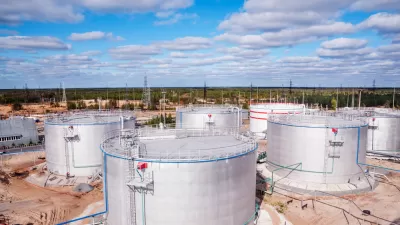What happened to the "strategic" in the nation's Strategic Petroleum Reserves? As Politico reveals, heretofore these oil reserves have only been sold when the nation's oil supply was threatened. Republicans leaders now view the SPR as a cash cow.
"The Senate’s proposed highway bill calls for unloading 101 million barrels to raise $9 billion for roadwork," write Darren Goode and Elana Schor, energy reporters for POLITICO Pro. "Two weeks ago, the House voted to sell 64 million barrels over eight years to help pay for an overhaul of the federal drug-approval process."
Either circumstance would mark a precedent for non-emergency uses of the reserves.
"Until now, the government has approved large sales from the reserve only three times, including during the first Gulf War [1990] and after the fuel price spikes that followed Hurricane Katrina [2005]" write Goode and Schor. The most recent instance occurred during the Libyan intervention in June 2011 when the U.S. and other nations released 60 million barrels "to keep the world supply stable" following the interruption of Libyan oil exports.
There are strict regulations controlling releases from the Strategic Petroleum Reserve, referred to as SPR, which is located within the Department of Energy (DOE).
"Decisions to withdraw crude oil from the SPR are made by the President under the authorities of the Energy Policy and Conservation Act," states the SPR website.
How would the Obama administration react to the Senate road financing proposal? A December 2013 post suggests that the Secretary of the Energy Department might be open to such a proposal. Dr. Ernest Moniz "said there are any number of policies crafted in the 1970s -- such as the Strategic Petroleum Reserve -- that might be re-examined in light of the United States' newfound position as a more robust producer of oil and natural gas."
No so open-minded is "Senate Energy and Natural Resources Chairwoman Lisa Murkowski (R-Alaska), who joined Democrats on Tuesday in voting to block the highway bill after she objected to selling oil to pay for it.
“A shortsighted sale that undermines our emergency preparedness could have real and lasting impacts on our security,” Murkowski warned.
Another oil-patch Republican, Rep. Joe Barton of Texas, expressed the same misgivings. “We need to look at the SPR, but it shouldn’t be the pay-for of choice for everything that comes down the pike,” the former House energy panel chairman said.
Proponents of releasing the oil believe that record domestic oil production "should offset concerns over tapping into the reserve," write Goode and Schor. "It’s yet another sign of how much the U.S. energy boom has eased the fears of scarcity that inspired the reserve’s creation during the oil-shock 1970s."
However, Goode and Schor note what some might call a double standard, others an evolving position, pointing to "House Energy and Commerce Chairman Fred Upton (R-Mich.), whose panel approved selling oil to raise $5.2 billion for a streamlined Food and Drug Administration approval process."
Upton notes that oil supplies held in the reserve and private U.S. storage facilities 'far exceed' the 90-day supply that the International Energy Agency says developed countries should hold.
Still, it’s an about-face for Upton, who had bashed Obama for opening the reserve’s taps in 2011 to calm the energy markets during the Libyan turmoil that toppled President Muammar Qadhafi. Republicans at the time accused the president of seeking to lower the price of gasoline for domestic political reasons, and Upton likened the 30-million-barrel sale to “a couple pawning their wedding rings for cash.”
Meanwhile, on Wednesday afternoon, the DRIVE Act (S.1647) cleared a critical procedural vote allowing the bill to be debated on the Senate floor.
"Forty-six Republicans and 16 Democrats combined forces to support the measure, which was opposed by 30 Democrats and six Republicans," reports Mike Blake of Reuters.
The Senate has "six workdays left before the House leaves for August recess and nine calendar days until transportation authority expires," writes Jennifer Scholtes for Politico Morning Transportation.
FULL STORY: Congress taps the oil piggy bank

Planetizen Federal Action Tracker
A weekly monitor of how Trump’s orders and actions are impacting planners and planning in America.

San Francisco's School District Spent $105M To Build Affordable Housing for Teachers — And That's Just the Beginning
SFUSD joins a growing list of school districts using their land holdings to address housing affordability challenges faced by their own employees.

The Tiny, Adorable $7,000 Car Turning Japan Onto EVs
The single seat Mibot charges from a regular plug as quickly as an iPad, and is about half the price of an average EV.

Trump Approves Futuristic Automated Texas-Mexico Cargo Corridor
The project could remove tens of thousands of commercial trucks from roadways.

Austin's First Single Stair Apartment Building is Officially Underway
Eliminating the requirement for two staircases in multi-story residential buildings lets developers use smaller lots and more flexible designs to create denser housing.

Atlanta Bus System Redesign Will Nearly Triple Access
MARTA's Next Gen Bus Network will retool over 100 bus routes, expand frequent service.
Urban Design for Planners 1: Software Tools
This six-course series explores essential urban design concepts using open source software and equips planners with the tools they need to participate fully in the urban design process.
Planning for Universal Design
Learn the tools for implementing Universal Design in planning regulations.
Smith Gee Studio
City of Charlotte
City of Camden Redevelopment Agency
City of Astoria
Transportation Research & Education Center (TREC) at Portland State University
US High Speed Rail Association
City of Camden Redevelopment Agency
Municipality of Princeton (NJ)





























